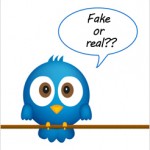 Earlier this month Italian researchers shed light on the booming market for fake Twitter followers. They found around 20 companies offering to sell fake followers, with around 1 million accounts in circulation. Some accounts simply followed their buyers, others were setup to automatically share or retweet content.
Earlier this month Italian researchers shed light on the booming market for fake Twitter followers. They found around 20 companies offering to sell fake followers, with around 1 million accounts in circulation. Some accounts simply followed their buyers, others were setup to automatically share or retweet content.
In a follow-up study, the same researchers are now shedding some light on just who are the people buying these fake accounts, and the sad thing is that they have unveiled some major names.
Their research explored accounts that had either gained or lost a large number of followers in a single day. They found some of the biggest names in business, such as Pepsi, Mercedes-Benz and Louis Vuitton. Celebrities were not immune either, with 50 Cent and Diddy found to be guilty of follower buying.
Diddy for instance was found to have grown his Twitter following by 185,000 on a single day in June last year. That represented a 3,000% increase on his daily average. Equally suspiciously he was found to have lost nearly 400,000 followers on a single day last month. Evidence that Twitter had found and banned a big chunk of fake followers?
As brands struggle to grasp the prickly question of social media ROI it is always going to be tempting to use follower numbers to justify their investment in social media.
“Many brands struggle to measure the top line value of social media,” Susan Etlinger from Altimeter said. “So there is a thirst to show momentum in different ways, one of which is to show that the brand has a bigger audience today than it did yesterday.”
While it is natural for followers to come and go, if you monitor accounts over a long enough period you can easily see what are natural fluctuations and what are unnatural.
Democrat politician Jared Polis for instance had historically been gaining 15 new followers per day over a two year period. So it kinda stands out when he gains 19,705 new followers on a single day in July last year. A few months later some 13,000 of those vanished, again in a single day.
“Nearly the exact amount of followers ‘magically appeared,’ then disappeared,” the researchers said. They suggested that the losses were more likely due to Twitter, which routinely deactivates accounts it deems fake.
50 Cent was another famous face who seemed to lose a massive number of followers very quickly. He lost 190,342 on a single day in January, which represented a 5,370% jump on his usual daily average.
Car brand Mercedes went even further, gaining 28,283 followers in one day last October. That was a huge 20,992% increase on the daily average for the past few years.
All of which makes the researchers assertion that the industry in fake followers could be worth anywhere up to $360 million quite believable.
Aside from the obvious flaws in buying fake people, who in turn seem unlikely to actually buy any of your products, the research also provides strong evidence supporting the improvements made by Twitter in removing fake accounts.
So either way the business of inflating your online ego seems rather a waste of time. Of course that doesn’t mean it won’t continue for a while yet.
Article republished from Technorati.
That's madness. Why would they do that? I mean some of those brands surely don't need such artifcial inflation?
Strange isn't it? Obviously none of the brands concerned have confirmed that they have been buying followers, but it sure does look fishy.
Just goes to show how warped the ROI is for so many social media campaigns.
Quite. Begs the question of whether brands don't know why they're on social media, or whether they don't know how to measure the valuable things, so instead settle for measuring worthless things instead.
right. and fake amazon reviews shouldn't work but there are some books where they get 100 reviews in the first couple weeks, ranked 50,000 which means maybe they only sold 100 books, and all the reviews are suspicious: not using real name, not authorized amazon purchases, and too similar (about a line and a half) and say little about the book. REAL comments by REAL people are sometimes very short, sometimes pages long. On average about 1 review per 1000 books sold based on the few books where I have data for number sold although this can vary. I think you can get as high as about 1 in 100 without gaming it.
Is there a market in 'buying' fake reviews David?
Fake reviews and fake accounts are a plague, but a reality nevertheless. I can only see a few specific occasions where fake accounts do some good: one example was from a music artist that garnered a couple hundred thousands views for his video, which can impress labels or distributors in order to get a contract. It worked, apparently. But the truth always comes out, in the end.
Examples given in your article show that most brands who purchase fans or views don't get social media, nor do they get its ROI mechanisms. Sad.
With the importance of things like hotel reviews I can only see this sort of thing spreading. At least until the review sites get a tighter grip on ensuring those leaving reviews have actually used the service.